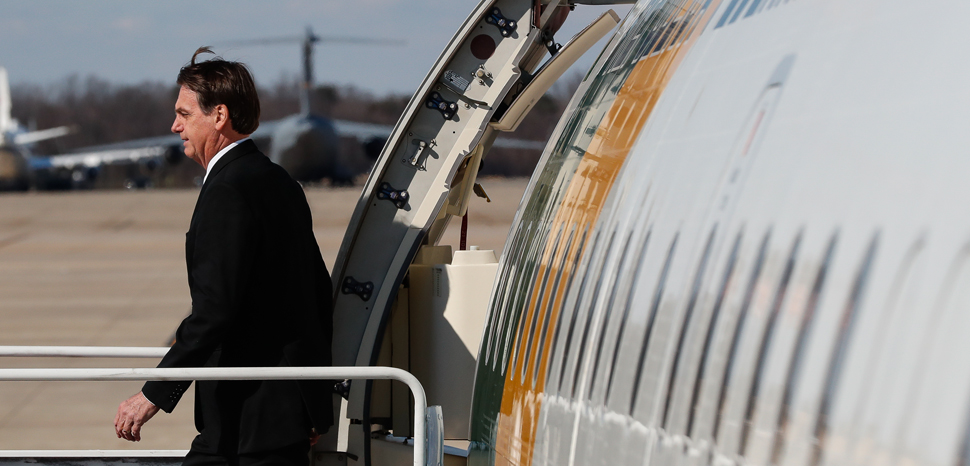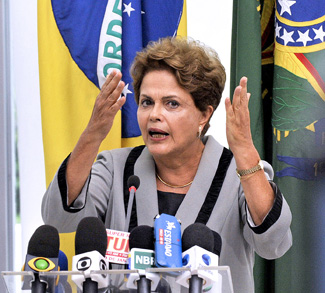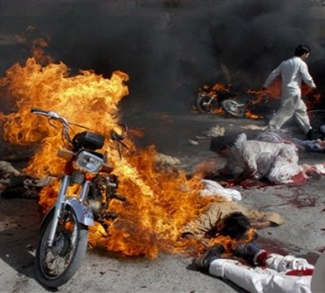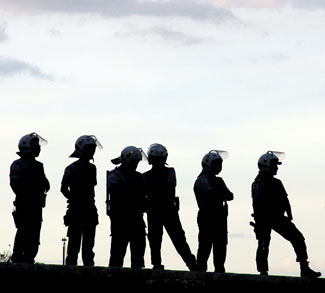The shocking suicide of former Peruvian president Alan García minutes before the police was set to arrest him on corruption charges has one again trained the spotlight on the global challenge of systemic graft, which is not only undermining the stability and democratic institutions of countries around the world, but driving political volatility and—in some cases—undermining faith in democratic norms.
This phenomenon is particularly acute in Latin America. Operation Car Wash has set off shock waves across the region. In Peru, García’s death is the last and most tragic example of a chain of events triggered by the revelation that four former presidents took bribes from Brazilian construction giant Odebrecht. Former President Pedro Pablo Kuczynski resigned last year, while his immediate predecessor Ollanta Humala is in pre-trial detention and the one before him, Alejandro Toledo, is a fugitive in the U.S.
Since Kuczyinski´s resignation the country has been engulfed in instability as both government and opposition forces are fending off corruption charges, whereas the judiciary is struggling to assert its independence. President Martín Vizcarra attempted to address citizen dissatisfaction with the litany of investigations through a referendum held in December, but four months later voters disapprove of his administration for the first time since he took office. Neighboring Colombia and Ecuador have held similar anti-corruption consultations in response to analogous corruption challenges at the highest levels of politics.
Outside the Andean region, the elections of Andrés Manual López Obrador and Jair Bolsonaro can also be interpreted as a reaction to widespread corruption. As candidates, both politicians ran on anti-corruption platforms that promised to eradicate graft and restore integrity in government. They promised to fight corruption with an iron fist, targeting those who benefit the most from a system almost unanimously seen as corrupt. However, the solutions they have posited—while superficially appealing—are already showing their limitations.
Let’s start with Mexico. López Obrador has made austerity and exemplarity a central piece of his government action, imposing draconian salary cuts for public employees, including himself, and renouncing to reside in “Los Pinos,” the official residence of Mexican presidents. To the dismay of private investors, he canceled the construction of a new airport in Mexico City, which was well underway.
Just how these examples of government frugality will allow López Obrador root out bribe-taking and other manifestations of corruption remain to be seen. Mexico has a national anti-corruption system that sets very ambitious goals to stop corrupt practices. There is a comprehensive legislative framework and regulatory framework in place to undercut the culture of impunity and institute better oversight of government bodies. Yet instead of proposing specific fixes to this relatively recent set of rules and institutions, for instance, by investing in its implementation at the state level, López Obrador has only offered vague rhetoric. Moreover, he has failed to appoint an independent anti-corruption prosecutor and other senior posts. Given his party’s majority of the two chambers of the Mexican Congress, there is a risk that these appointments might lack the independence needed for them to be effective.
In Brazil, Bolsonaro pledged to clean up government and root out corruption. Perhaps aware of the political obstacles ahead of him, Bolsonaro decided to signal a hardline approach by appointing as justice minister the judge responsible for former president Lula’s conviction on corruption charges, which prevented him from running during the last election when he was ahead in the polls. This decision was controversial, as Lula’s supporters saw the move as payment for helping him get elected, tainting the credibility of the Bolsonaro government’s anti-corruption agenda.
More importantly, Bolsonaro’s children and friends are the object of investigations for alleged illegal payments and other corrupt practices. Even if the president’s circle is ultimately exonerated, these allegations risk eroding the legitimacy of his administration to undertake much-needed reform at a time when trust in government institutions is dramatically low. Furthermore, and unlike López Obrador, Bolsonaro does not have the support of a wide-enough legislative coalition to pass some of the reforms he has proposed.
Although Mexico and Brazil are the most obvious examples of voters rewarding candidates who prioritize the fight against corruption irrespective of the solidity of their platforms, they are not alone. The recent trend towards using referenda to pass anti-corruption reform, from Peru to Ecuador to Colombia is proof that politicians are aware of the mobilizing power of the public’s perception of widespread corruption. However, a closer examination shows that most of the measures proposed to eliminate corruption through these proposed reforms—ranging from the introduction of higher penalties, to the limitation of electoral mandates or the proliferation of anti-corruption bodies—will have at best a relative effect in reducing systemic vulnerabilities to government waste and fraud. Too often, the grander the measure seems the more modest its potential effects.
In short, the appeal to magical thinking is almost certainly doomed to failure in addressing systemic corruption. Tough words and symbolic gestures are important tools to restore citizen trust, but they must be met by realistic analysis and well-thought proposals that can produce incremental change. Latin American governments have already agreed on far-reaching compacts to tackle corruption, most recently through the “Lima Commitment.” Outlining specific steps to achieve these objectives, ensuring enforcement, and learning from what works should now be the objectives of any decisive government program. Additionally, governments across the region ought to protect the work of investigative journalists, several of whom are killed every year for exposing corrupt cases.
Giving a response to corruption in the post-Operation Car Wash era continues to be Latin America’s most pressing democratic challenge. The political start-ups that have emerged in this new environment have nonetheless found success without providing their voters with the innovative answers they need. Instead, these political entrepreneurs have sold them a product Latin Americans are painfully familiar with—a combination of passionate rhetoric and unrealizable expectations.
The views expressed in this article are those of the authors alone and do not necessarily reflect those of Geopoliticalmonitor.com or any institutions with which the authors are associated.




